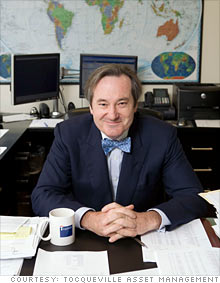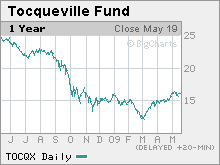A manager who loves scorned stocks
Robert Kleinschmidt scours the market for tarnished names - and bets on their recovery.
 |
| Robert: Kleinschmidt: "The art form to this is to find the right companies - we don't just buy the ones that are washed out." |

| MMA | 0.69% |
| $10K MMA | 0.42% |
| 6 month CD | 0.94% |
| 1 yr CD | 1.49% |
| 5 yr CD | 1.93% |
NEW YORK (Fortune) -- Are you a company that investors love to hate? Is your management conducting a restructuring or a massive refinancing? Do you belong to a troubled industry? Take heart: Robert Kleinschmidt, the manager of the $289 million Tocqueville Fund, may find you attractive.
"It's hard to make money when you're in the consensus," says Kleinschmidt, who has managed the fund for 18 years. "My starting point is to be opposed to the prevailing opinion."
The Tocqueville Fund, which Kleinschmidt calls "multi-cap" (it's classified by Morningstar under the amorphous "large blend" category), owns a collection of tarnished stocks and rehabbed names that were purchased on the cheap. The fund tumbled last year alongside the category average, but as of March 31, it boasts a 2.5% ten-year return, compared with the S&P 500's 3% drop.
Because of Kleinschmidt's opportunistic investing style, Tocqueville tends to benefit long-term holders who wait out turnarounds at the companies in its portfolio. A positive sign for 2009: The fund outperformed the market after the 2001-2 recession by 16%.
Kleinschmidt's strategy is more complex than simply combing through the market's blacklist. He first identifies a company saddled with a negative investment consensus, then decides whether a turnaround is feasible. That entails evaluating the management team and whether or not they have a credible strategy for improvement. Their plan must be achievable in his investing horizon, which is three to five years.
"We decide what type of returns and margins the company needs to attain for the consensus to change," says Kleinschmidt. "The goal is to grab something before that change happens - that's the best way to grab equity returns."
Another rule: Avoid companies with low-quality balance sheets. "When you're buying stocks with negative near term prospects, you don't want to compound that situation with shaky financials," he says.
Kleinschmidt has made several successful calls over the years, including buying Microsoft (MSFT, Fortune 500) and Cisco (CSCO, Fortune 500) four years ago, "when they were dramatically out of favor." Since then, those companies have done well, but he continues to hold them because he thinks they're undervalued. "These are cash machines with little debt and high returns on capital," he says. "But they're still facing a mixed consensus."
Therein lies a key component of Kleinschmidt's strategy: He buys stocks when they're disliked by most investors, but continues to hold them long after they recover if he thinks they still have growth potential. While big tech stocks are hardly shunned by mutual funds these days, Kleinschmidt thinks they're under-appreciated by the market.
The steady returns he derives from these winning picks buttresses his riskier calls, like his recent forays into commodities stocks. Those companies were creamed last fall when the speculative commodities bubble burst, causing then to dump inventories of raw materials. That liquidation, says Kleinschmidt, has caused a drop in supply that's more dramatic than the decline in demand. An inflationary environment would also boost the prices of raw materials, making commodities a "buy," he says.
Kleinschmidt's contrarian strategy extends beyond simply buying shares of commodity companies, which have rebounded in recent weeks. He's interested in the names that still make some investors cringe, like Alcoa (AA, Fortune 500), a metals producer with negative profit margins whose stock has dropped 78% over the last year.
"We sold Alcoa last year because we were concerned about its financials," says Kleinschmidt. "But then the company did some fairly bold restructurings and pushed its debt further down the road. At that point, we went back in. It's a risk, but it's a world leader in aluminum, which will benefit from a recovery."
Another polarizing stock that Kleinschmidt prefers is Murphy Oil (MUR, Fortune 500), an oil producer with downstream operations. Murphy is currently trading at just seven times earnings, due in part to its high-risk exploration attempts and reliance on a few assets.
Kleinschmidt likes the stock for precisely that reason. "It's not just a value, but also a small enough company so that you'll see a significant gain in the stock," he says. "Additionally, it's an attractive acquisition target for one of the larger oil producers." Murphy has a debt to book ratio of just 0.1, and a 24% return on common equity, compared with the 18% industry average.
Surprisingly, financials, while beaten-down, don't hold much appeal for Kleinschmidt, because the companies fail to meet his turnaround growth criteria. "You would have thought that we would be aggressive there, but the returns in banking are going to be subpar for a period of time," he says. "Each dollar of equity will control fewer assets."
Kleinschmidt says he isn't just a contrarian for the sake of argument - he's betting on companies that he really believes have growth potential. "The art form to this is to find the right companies - we don't just buy the ones that are washed out," he says.
In other words, not every ugly duckling is a swan waiting to emerge. ![]()
-
 The retail giant tops the Fortune 500 for the second year in a row. Who else made the list? More
The retail giant tops the Fortune 500 for the second year in a row. Who else made the list? More -
 This group of companies is all about social networking to connect with their customers. More
This group of companies is all about social networking to connect with their customers. More -
 The fight over the cholesterol medication is keeping a generic version from hitting the market. More
The fight over the cholesterol medication is keeping a generic version from hitting the market. More -
 Bin Laden may be dead, but the terrorist group he led doesn't need his money. More
Bin Laden may be dead, but the terrorist group he led doesn't need his money. More -
 U.S. real estate might be a mess, but in other parts of the world, home prices are jumping. More
U.S. real estate might be a mess, but in other parts of the world, home prices are jumping. More -
 Libya's output is a fraction of global production, but it's crucial to the nation's economy. More
Libya's output is a fraction of global production, but it's crucial to the nation's economy. More -
 Once rates start to rise, things could get ugly fast for our neighbors to the north. More
Once rates start to rise, things could get ugly fast for our neighbors to the north. More







